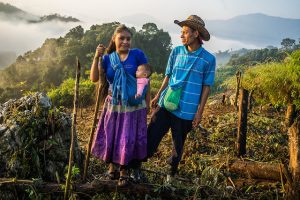
EL BATAN, Mexico (CIMMYT) – In a move to bolster gender equity in agriculture, the International Maize and Wheat Improvement Center (CIMMYT) will launch a series of training courses promoting the integration of gender awareness and analysis in research for development.
“Gender is a defining factor in farming and influences many areas, for example, resource ownership and adoption of new technologies,” said Marion Büttner, a gender specialist at CIMMYT. “These courses will help researchers understand the importance of gender roles, relations and norms in agriculture and integrate gender analysis into their work, strengthening agricultural research for development outcomes.”
Although women account for 43 percent of the agricultural labor force in developing countries, they are 30 percent less productive than men, according to the U.N. Food and Agriculture Organization (FAO). This is due mainly to unequal access to extension services and resources, such as land and improved seed.
Despite such trends, agricultural research often fails to include gender analysis in projects, opting instead for a gender-unaware approach that neglects women’s and men’s important roles and their different needs and opportunities in agriculture, Büttner said. “The trainings are an important step to address this gap,” she said.
The Gender Capacity Strengthening Program was developed in partnership with the Royal Tropical Institute (KIT in its Dutch acronym) gender training team and Cultural Practice, LLC. The sessions will be rolled out from April for researchers and support staff at CIMMYT offices in Africa, Asia and Latin America.
The main focus of agriculture for development is to research the biophysical aspects of introducing new agriculture technologies and management practices. This often diverts attention from the social analysis that reveals the human context in which new technologies and practices are introduced, said Franz Wong, a senior gender advisor at KIT who will be one of the training facilitators.
Failing to understand gender issues in a specific local context may cause contrary results to what researchers set out to accomplish, Büttner said. For example, the mechanization of an agricultural activity may lead to reduced drudgery for women. However, the same process may also result in men taking over these now successful activities, which could shift power dynamics between men and women and potentially increase already existing inequalities between genders.
“To gain the most knowledge and impact from agriculture for development initiatives, researchers should consider what impact interventions will have on both men and women,” Büttner said. “The concept of gender is often confused with simply adding women to strategy development, but it’s not that straightforward. It’s about addressing the needs and constraints of both men and women and changing relations to improve the situation for all.”
Büttner refers to gender-responsive research, which is designed to ensure that both women and men benefit from research interventions. It analyzes and takes into account how gender relations influence men and women’s ability to access and adopt improved agricultural technologies, including new knowledge and practices, as well as how policies and other interventions affect women and men differently.
Large donors like the Bill & Melinda Gates Foundation, the United Stated Agency for International Development (USAID) and German Corporation for International Cooperation (GIZ, for its acronyms in German) require gender-responsive research, which is part of the reason why gender analysis must become a standard process for researchers, Büttner added.
The program aims to position gender analysis as a routine process at all stages of the research cycle. Different training modules offer insight into gender-responsive research, including developing and implementing projects with gender integration and setting indicators to measure gender outcomes.
“Raising awareness of the benefits gender analysis has on the impact of agriculture for development projects is the best promoter of its inclusion in research,” said Maitrayee Mukhopadhyay, a senior gender advisor at KIT who aided in the development of the program.
“Many agriculture for development researchers do not see the relevance of gender for their work because they lack adequate training and exposure to gender analysis and knowledge,” she added.
Pilot workshops of the program were delivered last October at CIMMYT’s headquarters and gained strong reviews, with participants reporting increased gender awareness and knowledge of practical methods to integrate gender into projects.
Researchers are keen to integrate gender once they become aware of how gender-responsive research helps to make an assessment of how agriculture is organized in a community, and how it aids the design and delivery of relevant agricultural technologies that complement gender roles or transform them to increase equality, Wong added.
Both Büttner and Wong said the gender training was purposely designed to be practical and interactive so that participants could apply methods to their areas of expertise.
The program will begin in April in Ethiopia, followed by sessions in other CIMMYT offices in Kenya, Zimbabwe, Bangladesh, India, Nepal and Mexico.
Büttner is one of five experts working at CIMMYT as part of the GIZ sponsored CIM Integrated Experts program. The CIM program aims to strategically place managers and technical experts in public and private organizations in the developing world to pass on their professional knowledge and contribute to capacity building.
 Gender equality, youth and social inclusion
Gender equality, youth and social inclusion 
